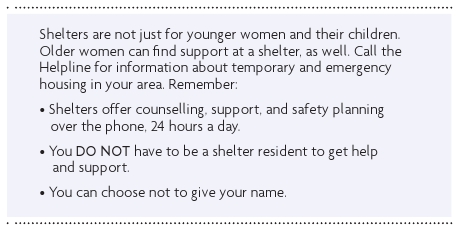Where to find help

If you or someone you know is being abused or neglected, help is available. Here are some resources in Nova Scotia.
- 911
- Your local police
- Senior Abuse Information and Referral Line
- Seniors' Safety Programs
- Legal Information Line and Lawyer Referral Service
- Adult Protection and Protection for Persons in Care
- Helpline

911
Call immediately if the situation is an emergency. You call will be answered 24 hours a day.

Your local police
Call your local police if the situation is not an emergency but you suspect it might be against the law. Ask to speak to someone who has been trained in senior abuse, or domestic/family violence.

Senior Abuse Information and Referral Line
Call for information about senior abuse or to talk about a situation of abuse. Your call will be kept confidential. Leave a message if a person does not answer the phone. This is not a crisis line. The Department of Seniors cannot investigate, but it can tell you about resources in your community.
1-877-833-3377 toll-free in Nova Scotia
902-424-3163 out of province


Seniors' Safety Programs
Many communities have a Seniors' Safety Program. The programs operate in partnership with local police agencies, including RCMP, municipal police, or town police. Seniors' Safety Programs promote education and awareness about senior abuse, crime prevention, and safety and health issues. To find out about a program in your area, call the Senior Abuse Information and Referral Line (listed above) or check the Positive Aging Directory, published by the Nova Scotia Department of Seniors.

Legal Information Line and Lawyer Referral Service
Call to learn about the law, the justice system, or how to find a lawyer in Nova Scotia.
1-800-665-9779 toll-free in Nova Scotia
902-455-3135 in Halifax region

Adult Protection and Protection for Persons in Care
Call if you know of a senior who is being abused or neglected and needs protection. Leave a message. All messages are returned.
1-800-225-7225 toll-free in Nova Scotia
902-487-0640 out of province
The Department of Health and Wellness will investigate if either of these laws apply:
- Adult Protection Act—for adults who cannot physically or mentally protect or care for themselves
- Protection for Persons in Care Act—if the abuse happens in a licensed health facility, such as a nursing home, residential care facility, or hospital




Your neighbours, friends, and family members are important resources, as well. Think about who you can talk to within your own circle of care. Reach out to make your circle wider and stronger.


